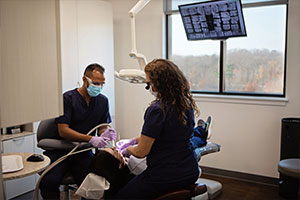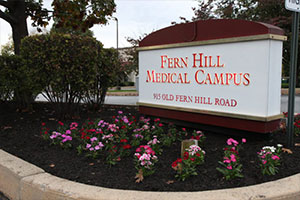Fixing Chipped Teeth West Chester, PA
Did you Know Fixing Chipped Teeth Can Actually Lead to Your Dream Smile?
 Chipped teeth, although rarely painful, can become problematic when left untreated. Plus, many people who fall victim to a chipped tooth don’t like the way it affects their smile. Fixing chipped teeth is usually an easy process that helps ensure you don’t run into any oral health issues. But, it can also give you a smile that you’re truly happy with!
Chipped teeth, although rarely painful, can become problematic when left untreated. Plus, many people who fall victim to a chipped tooth don’t like the way it affects their smile. Fixing chipped teeth is usually an easy process that helps ensure you don’t run into any oral health issues. But, it can also give you a smile that you’re truly happy with!
At Chester County Family Dentistry we offer several remedies to help fix chipped and cracked teeth. Keep reading to learn more about how to improve chipped teeth, and in doing so, achieve a beautiful smile makeover.
Why It’s Worth Looking Into Fixing Chipped Teeth
 Teeth can chip for any number of reasons. For, example, one wrong bite on hard candy or a piece of ice may do the trick. But, there are other factors that can contribute to teeth chipping, which include:
Teeth can chip for any number of reasons. For, example, one wrong bite on hard candy or a piece of ice may do the trick. But, there are other factors that can contribute to teeth chipping, which include:
-
Sudden Impact
A blow to the mouth, often by way of a rogue baseball, football, or from a sports collision can chip or crack a tooth.
-
Poor Oral Hygiene
Sometimes when teeth have not been taken care of properly—through regular brushing, flossing, and routine checkups and cleanings—tooth enamel can become thin and more susceptible to damage. Cavities, for example, weaken the teeth and increase the likelihood for chipping and cracking.
-
Excessive Teeth Grinding
Also referred to as bruxism, teeth grinding, which often happens during sleep, can cause teeth chipping.
From time to time, Dr. David Montgommery and Dr. Ryan Dunn have a patient who wants to know the benefit of fixing a chipped tooth. If it’s not painful or isn’t in a place where you can see it, who cares … right? The problem with leaving a chipped tooth alone is that you don’t truly know the extent of the damage to the tooth enamel or root/nerve—only a dentist can appropriately advise you based on the results of dental imaging.
Ask the ExpertsDifference Between Chipped and Cracked Teeth
 Just as there are several ways a tooth can chip, there are also different degrees of damage. When your dentist examines your chipped tooth (or teeth) he will assess whether there has actually been a chip, or a more severe crack in the tooth.
Just as there are several ways a tooth can chip, there are also different degrees of damage. When your dentist examines your chipped tooth (or teeth) he will assess whether there has actually been a chip, or a more severe crack in the tooth.
Generally, you will know if a tooth has cracked because you will experience:
- Visible sign of a crack, or piece missing from the tooth
- Changes in temperature when eating something cot or hold cause pain and sensitivity in your teeth and jaw
- Pain occurs when you attempt to bite or chew food
As we mentioned earlier, while most people do not experience pain from chipped teeth, they may notice that the look and feel of their natural teeth is noticeably different. This all depends on the extent of damage and location of the “chip.” These factors will also dictate what type of treatment your dentist recommends.
Assessing Degrees of Damage to Determine Treatment
 Sometimes, if a tooth has only been mildly damaged, let’s say a “minor chip,” your dentist may simply be able to polish and smooth the area. In the case of a moderate-sized chip, which may mean the tooth enamel has been subject to damage, your dentist may recommend a filling or crown. This ensures that the tooth remains protected from potential infection and any future problems.
Sometimes, if a tooth has only been mildly damaged, let’s say a “minor chip,” your dentist may simply be able to polish and smooth the area. In the case of a moderate-sized chip, which may mean the tooth enamel has been subject to damage, your dentist may recommend a filling or crown. This ensures that the tooth remains protected from potential infection and any future problems.
Larger chips in the teeth that expose the nerve of your tooth may need a more extensive dental procedure to fix. Your dentist may want to perform a root canal before placing a restorative option (such as a crown).
But, whether one tooth or a few teeth have been chipped or cracked, there are additional issues to consider prior to opting for a specific dental treatment plan.
Looking at the Whole Picture (or Smile)
 Although you may not initially think to consult with a cosmetic dentist when a tooth chips or cracks, there are several cosmetic dentistry options to help improve the appearance of your entire smile. Think of your chipped tooth as an invitation to the perfect smile! If you also have discolored, misshapen, or crooked teeth it may be time to think about the following restorations.
Although you may not initially think to consult with a cosmetic dentist when a tooth chips or cracks, there are several cosmetic dentistry options to help improve the appearance of your entire smile. Think of your chipped tooth as an invitation to the perfect smile! If you also have discolored, misshapen, or crooked teeth it may be time to think about the following restorations.
-
Veneers
Made from porcelain, veneers cover the front of the teeth, leaving them looking smooth, uniform, and attractive. Of the major cosmetic dental options, veneers are long-lasting, holding strong from 10 to 20 years.
-
Crowns
We briefly discussed this option earlier as a protective solution for damaged teeth. Crowns not only cover the entire damaged tooth, but they can also restore teeth to their natural shape and size. Other benefits of crowns are strengthening teeth, correcting discolored teeth, protecting a weak tooth from breaking, and enhancing appearance. The material used for crowns is tooth-colored to closely resemble the natural appearance of your teeth.
-
Bonding
If you have a minor chip, this inexpensive cosmetic dental procedure might be the answer. Composite resin is shaped to match the surrounding teeth, covering up discolored or chipped teeth. Bonding can also improve gaps between the teeth.
How Do You Know Which Option is Best for You?

The best way to know which restorative dental procedure is best for you is to schedule a consultation with Dr. Montgomery or Dr. Dunn. With combined decades of experience in addressing chipped and cracked teeth, our expert CCFD dentists will be able to help you find a customizable solution that works best for you!
Schedule a consultation now. Or, call one of our CCFD team members today with any questions you may have.Book My Appointment 610-431-0600